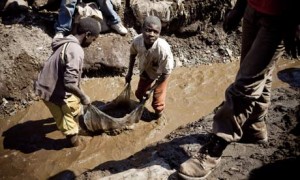The primary goal of a business is to make and maximize its profits. In many cases the line between what is best for the business and what is morally correct can be skewed by the pursuit for an increased profit. This is where the issue of business ethics arises. In the article “A Deadly Grind,” the line between what is morally acceptable and what is not is crossed. This “scandal lies with the more than one million children doing artisanal mining – poisonous work on the margins of the industry” (York). In the Democratic Republic of the Congo, children toil in a toxic pit for bits of copper. It’s vitally important that businesses maximize the profits for all stakeholders, including employees. Milton Friedman states that corporate executives have the responsibility “to make as much money as possible while still conforming to the basic rules of society, both those embodied in the law and those embodied in ethical custom” (Friedman). Although the businesses running theses mines profit from their unethical methods, they break the basic rules of society. Employing any human being in such a dangerous job can be seen as unethical, but using women and children for this is, in fact, against the law. In addition, not all stakeholders are benefiting and rights and regulations are being completely disregarded. Ultimately, these immoral procedures continue to be utilized due to the fact that both the workers and the businesses want to make a profit.
Works Cited
Wachman, Richard. “ENRC pays $1.25bn to settle dispute over Congo mining deal.” The Guardian. N.p., n.d. Web. 5 Jan. 2012.
York, Geoffrey. “A Deadly Grind.” The Globe and Mail [Toronto] 18 Aug. 2012: F.1. Print.
Zimmerli, Walther, Markus Holzinger, and Klaus Richter. “The Social Responsibility of Business Is to Increase Its Profits.” Corporate Ethics and Corporate Governance. New York: Springer, 2007. 173-178. Print.
